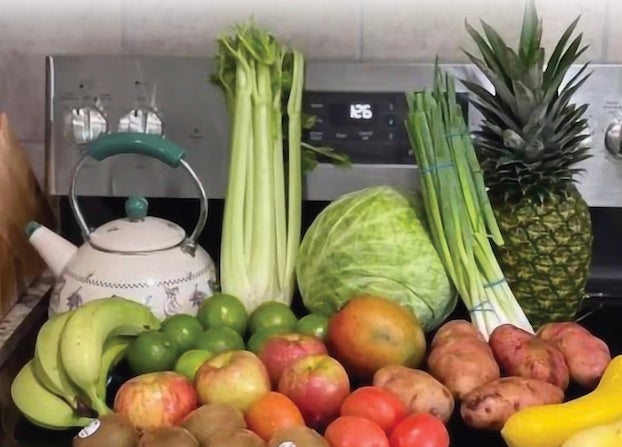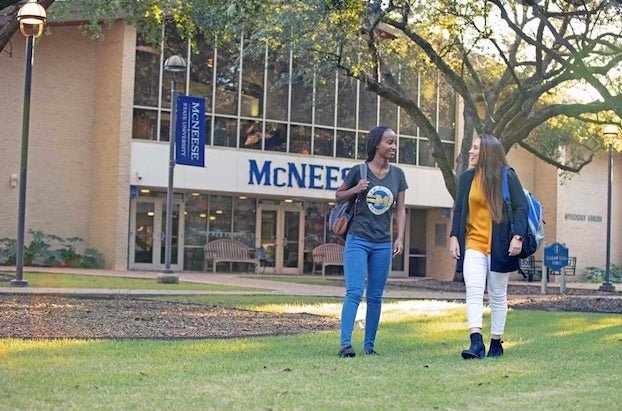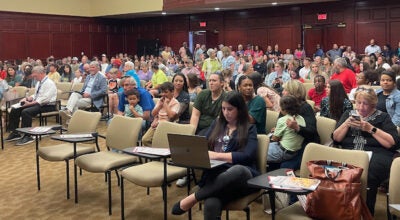Bountiful Baskets: A new way to buy produce
Published 12:45 pm Saturday, October 2, 2021

- Co-op members sign up for the service through boutifulbaskets.org and create a free account where orders can be placed for the biweekly program. The baskets are $18 each plus a $1 fee for every order, which is given to the delivery driver. (Special to the American Press)
Cases of colorful fruits and vegetables line the tables outside the Moss Bluff VFW every other Saturday. The fresh produce is delivered biweekly to the site where volunteers then organize and separate the fruits and vegetables for participants who have contributed to Bountiful Baskets.
Bountiful Baskets is an all-volunteer co-op in the greater Lake Charles area whose members pool their money to buy fresh produce in bulk.
“Everyone who helps out are volunteers, which means that all of the money that people pay when ordering their baskets goes to purchasing the produce so we are able to provide fresh healthy produce for a really low cost,” said volunteer site coordinator Emily Fryberger.
Fryberger said she started volunteering with the group after her family moved to the area from Washington.
“When we first moved here, there were not a lot of healthy choices available so I spent a year driving up to Leesville, where they already had a Bountiful Baskets site, learning how to run a site,” she said. “Then I went through all the steps to open a site here in Lake Charles.”
The concept is based on the mutual need to save money on grocery bills while providing a healthy diet for families. Because money is pulled together, prices for the food are kept substantially low. Co-op members sign up for the service through boutifulbaskets.org and create a free account where orders can be placed for the biweekly program. The baskets are $18 each plus a $1 fee for every order, which is given to the delivery driver. First-time participants are also charged a $3 administration fee that goes toward the upkeep of the website.
Every other Saturday, members can pick up their basket of produce at the Moss Bluff VFW, 2668 U.S. 171, through a convenient drive-thru service.
The co-op mutually benefits participants with no contracts or commitments other than to log on, select and purchase from the weekly options.
“Ordering is always the Monday and Tuesday before pickup and the program is offered year-round — unless it happens to fall on the weekend before Christmas or New Year’s,” she said.
The produce is supplied through Bell City Produce out of Baton Rouge, which uses nearly all locally-grown produce to fill the baskets.
“Some things just don’t grow well down here, like apples, so some items have to be brought in, but anything they can get locally they do,” Fryberger said. “They deliver to the site in case quantities and then volunteers divide the produce between the number of baskets purchased for that cycle.”
The baskets are seasonal and generally include an even split of vegetables and fruits.
“They get six different types of veggies and six different types of fruit,” she said. “As we come into fall, veggies tend to be more in season than fruits so we may end up with more vegetables.”
Each basket contains 12 different types of produce.
“Not just 12 items but four or five of each type of item,” she added.
Fryberger said she receives a truck sheet in advance letting her know what produce the site is expected to get that week — such as cases of lettuce, apples, bananas and broccoli.
“Then we go over the order list and make sure we have enough so that everyone gets one head of lettuce, one broccoli crown, five apples, four plums, whatever it may be,” she said. “Last time we had 22 heads of lettuce left over and 23 crowns of broccoli extra so we go through and distribute those items into the baskets so that nothing goes to waste. On those weeks, members may get two heads of lettuce or two crowns of broccoli. Not everybody will get the same ‘extra’ but everybody will get extras.”
The 10 volunteers — one who drives as far as Kinder to help — also get to pick a “thank you item” before the extras are divided out.
Before Hurricane Laura devastated the area, nearly 96 baskets were ordered each week; today, that number is about 30.
“My goal is to eventually have our site selling consistently 96 baskets again so then we can open a second site in Kinder and maybe another one in south Lake Charles to make it more accessible for people who don’t want to drive so far,” she said.





